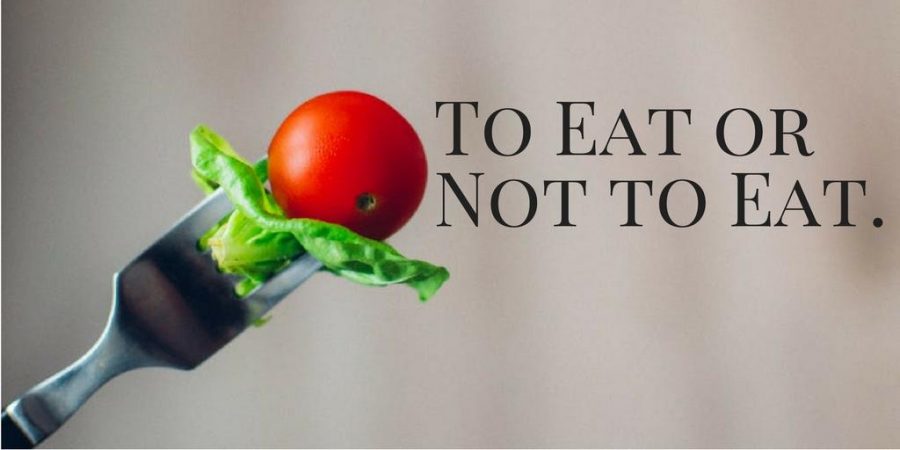Proteins, carbohydrates, fats, and necessary vitamins and minerals are all provided through food, and contribute to the overall functioning of our bodies. However, what may be delicious and exciting to some, could be another’s worst enemy.
Living with the ghost of an eating disorder looming over your shoulder is not only detrimental to your health, but it is also mentally, physically, and emotionally exhausting. Those who struggle often times can’t fathom the idea of going through a day without thinking about what they’ll eat, when they’re going to eat, or what “consequences” they’ll need to endure for consuming certain meals.
Disorders like these can be seen in people of all different shapes, genders, and sizes — they are silent but deadly. In fact, eating disorders have the highest mortality rate of any mental illness, and most of the time nobody even notices those who are struggling.
Lake Forest High School social worker, Daniel Maigler states, “A student can eat five small, healthy meals a day, never restrict or purge, but still have an eating disorder if they spend their day obsessing about the food they consume, or if they feel a compulsion to go and exercise for 2 hours at the gym after finishing a 2-hour track practice. If someone eats a muffin and feels like they are a bad person because of it, then we might be dealing with an eating disorder.”
There have been many instances, particularly throughout my high school years, that I have overheard or sat in on conversations which evolved around somebody else’s eating habits. Comments along the lines of, “just eat it, it’s not that hard,” or, “she never eats, it’s so annoying,” add to my itching frustration with society’s clear misunderstanding and insensitivity to eating disorders. 50-80% of the risk for anorexia and bulimia is genetic — it’s nobody’s to get caught in the endless cycles of shame, regret, conflict, and distress that an eating disorder can induce.
Maigler adds, “From my perspective I always say that I believe eating disorders are the second hardest of all the addictions to treat. With most addictions you can utilize the abstinence model, no more drinking, smoking, self injury, gambling, etc… With eating, however, it is so much more challenging because you have to eat and not eat. It is like an alcoholic being asked to live in a bar, and drink just a little.”
All of the sources quoted in this story have been granted anonymity. All students quoted are Lake Forest High School students of various ages.
“In Lake Forest I really think people overlook the fact that this disease kills. I was 90 pounds when I was first checked into a program and I am a decently tall girl. My organs were starting to shut down. I would be wearing at least 3 layers and a winter jacket to stay warm, my hair was falling out, and I was getting a thin layer of dark hair on my body, but people I know were spreading rumors that I was faking to get attention.”
“I would constantly be thinking about how many calories I had consumed or where the nearest bathroom was during a meal. I would think of ways to casually slip away so no one noticed I left for the bathrooms after each meal. It was like having another voice in my head that I couldn’t get to shut up.”
“It’s like knowing you are in the wrong about something deep down, but still fighting to justify yourself because you want to reach an image of perfection that is impossible to obtain. In that mindset, the only clear bad guy is something that is a saver of lives, which is food itself.”
“I’ll restrict for as long as I can, until my body is starving. I eventually end up binging on huge amounts of food because I’ve been so hungry for so long. The next couple of days will be followed by binging and purging, until I feel like I have gained too much weight, and then I’m right back at square one, restricting again. I know food shouldn’t be so complicated and I feel so embarrassed in social situations, but my disordered thoughts never seem to go away no matter how badly I want them to.”
“Eating disorders aren’t about the idea of being “skinny.” It’s not as much about the food and the weight as people think. It is a way to numb, a way to cope, similar to a drug addiction.”
“It wasn’t something that I chose to do off of a whim, I didn’t intentionally push food away, it was more of a “if you eat this then you’re going to get fat.” I would lie to my Mom and tell her that I ate at school when I would just sit in the school library or the bathroom to avoid being around food. Dinners were probably the worst, I’d eat w my mom, but I’d spit my food out or move it around the plate. After a while I began purging, trying to get rid of even the water I’d consume. I didn’t think it was a problem until I went to the doctors for a check up and they told me that within 3 months I lost over 45lbs. It was a huge wake up call because I realized that I was slowly killing myself. Everyday was a struggle, and I spent a lot of time in and out of hospitals. It was scary.”
“Eating disorder behavior can be subtle. They can be caused by so many different things. Personally, I struggle with obsessive compulsive disorder and general anxiety along with eating disorder mindsets/tendencies. The negative effects of my ocd and anxiety are what caused me to struggle with eating and body image.”
“There is nothing easy about it. Your mind is caught on it 80% of the time just thinking about every detail about food. Should I️ eat, should I️ not? Should I️ take adderall or diet pills? Going through the days of senior year, food became my worst enemy. I️ hated I️t. I️ wouldn’t go to family meals which detached me from them. I️ didn’t go off campus for lunch with my friends which drew me from them. I️ spent four months in an eating disorder program. I️ was placed in a dinner group with girls who had been hospitalized. I️ didn’t think I️ was that bad, but if I️ had continued doing what I️ was doing I️ would’ve ended up having that experience as well.”
“I was always tired and cold and after not eating for so long, it became more of a lifestyle, rather than just a habit. It was really hard on my family — there were times where my mom would come in my room at night and check on me and she’d feel my head and I’d be ice cold. To this day I still struggle with it but not nearly as much.”
“Being an athlete you are always hyperaware of your own physical fitness, size, and of course eating habits. I have always been a bigger girl, which comes in handy with athletics at sometimes, but other times you stare in the mirror and pick out the little imperfections. I have always been warned by my mother that if I kept eating the way I want I will become “fat girl with the pretty face.” Little did she know I wasn’t eating and was already that. When the “water diet” didn’t work I tried everything in the book and eventually turned to binge eating a purging. My body only experienced the negative side effects and no weight loss occurred.”
“The thing that is hard about recovery is that it is a 24/7 process, there are no days off and you are really dedicating your time to helping yourself, it is a disease that you have for a lifetime, sometimes are easier while other times are very difficult. I️t is one thing being a teenager with already a sensitive self image but adding anorexia and body dysmorphia on top of it, things get pretty tough.”
“If there is one thing my disorder taught me, I would say it taught me how to be strong and appreciate who I am as a person. I know it sounds cheesy or cliche but it’s true. You are given one chance at life. You are given one chance to treat yourself with love. You get one chance to be you. So do it.”
Click here to contact the National Eating Disorder Association hotline through email, text, or a phone call.













